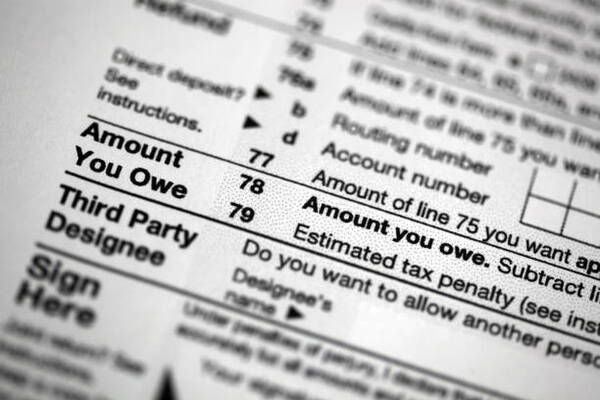Missing a tax payment can feel daunting, but it’s not the end of the world. While the IRS imposes penalties and interest for late payments, it’s unlikely you’ll face prison for tax evasion unless there’s intentional fraud involved. Understanding the financial consequences is the first step toward managing your situation and avoiding unnecessary stress.
If you can’t pay your full tax liability by Tax Day, don’t ignore it—filing your return or requesting a six-month extension is a must. After filing, take time to review your options for paying what you owe, whether through a payment plan or other relief programs. This guide will outline the potential repercussions of late filings or payments and equip you with practical steps to resolve your tax debt.

Penalty Relief and Filing Tips When You Owe but Can’t Pay
If you’re unable to pay your tax bill, it’s still crucial to file your return or request an extension to avoid additional penalties. The failure-to-file penalty is substantial, starting at 5% of the unpaid balance for every month or part of a month the return is late, capped at 25%. Filing, even without immediate payment, prevents unnecessary financial complications and keeps you in compliance with tax regulations.
When a return is delayed due to fraud, penalties escalate to 15% per month, significantly increasing the amount owed. For returns filed more than 60 days late, a minimum penalty applies, equating to either $485 or 100% of the unpaid taxes, whichever is lower. On top of penalties, interest accrues on unpaid balances at rates that adjust quarterly, currently at 8%, which can significantly add to your total liability over time.
If you’ve maintained good compliance in the past, you may qualify for penalty relief through a first-time abatement program. This option can waive penalties for late filing and payment, offering some relief while you address your tax debt. However, interest typically cannot be reduced, making it important to act promptly to minimize the financial impact and keep your tax obligations under control.

Flexible Payment Solutions When You Owe Taxes
Owing taxes doesn’t have to be overwhelming if you know your options and take the right steps. Whether you’re dealing with a large balance or a short-term cash flow issue, there are practical solutions to help you stay on track. By understanding the tools available for managing tax debt, you can address what you owe confidently and avoid unnecessary financial stress.
Explore the Benefits of Setting Up an Installment Agreement
If paying your full tax balance upfront feels overwhelming, an installment agreement can provide flexibility. This option lets you spread your payments over time, with terms depending on how much you owe and your ability to pay. However, if you can pay the full amount within six months, a short-term extension might be a better choice.
Setting up an installment agreement reduces the failure-to-pay penalty to 0.25% per month, but interest continues to accrue at the federal short-term rate plus 3%. Online direct debit plans come with a low setup fee of $22, and even lower-income taxpayers may qualify for waived fees. Filing promptly and arranging a payment plan helps you stay on top of penalties and interest charges.
Short-Term Extensions Offer Immediate Relief
A short-term extension gives you up to 180 days to pay your taxes, offering quick relief for taxpayers who need extra time. While there’s no fee to request this extension, penalties and interest still apply to unpaid balances. Filing on time reduces penalties to 0.25% per month, which can significantly ease the financial burden.
This option is ideal for those who can pay their balance in full within six months but need a little extra time to organize their finances. By filing the appropriate forms or contacting the IRS directly, you can secure this extension without unnecessary fees associated with installment agreements. Acting promptly ensures you meet your obligations without additional complications.
Leverage Your 401(k) to Address Tax Debt
If you need quick access to funds, borrowing from your 401(k) plan may be an option if allowed by your provider. You can typically borrow up to 50% of your vested balance, up to a maximum of $50,000. However, failure to repay the loan within five years can result in it being treated as a taxable distribution, potentially triggering additional penalties.
This option can provide a convenient and low-cost solution for paying off taxes, but it comes with risks. If the loan isn’t repaid, it could impact your future retirement savings, and early withdrawals may result in a 10% penalty. Before considering this route, consult your plan administrator and weigh the long-term financial impact carefully.
Request a Hardship Extension for Financial Relief
Taxpayers experiencing financial hardship may qualify for a payment extension by demonstrating that paying their tax balance would cause undue financial strain. To apply, you must file Form 1127, including a detailed statement of your assets, liabilities, and overall financial situation. While penalties are waived with this extension, interest continues to accrue at the federal short-term rate plus 3%.
This option is particularly helpful for those genuinely unable to meet their tax obligations due to significant financial challenges. By providing thorough documentation of your hardship, you can potentially delay payment while addressing your financial situation. Acting quickly ensures you take advantage of this option before penalties escalate.
Using a Debit or Credit Card for Convenience
Paying your tax balance with a debit or credit card offers convenience and flexibility, though it’s important to consider the associated costs. Debit card payments come with nominal processing fees, while credit card payments are subject to percentage-based fees, typically ranging from 1.82% to 1.98%. Additionally, credit card interest rates, often exceeding 20%, can make this a costly option over time.
This method is ideal for taxpayers who prioritize convenience or want to take advantage of credit card rewards such as cash back or travel points. However, high balances can impact your credit score, so ensure you have a plan to manage repayment. Always verify payment processors and fees to avoid unnecessary expenses.
Consider a Personal Loan for Tax Debt Management
For taxpayers seeking external financial help, personal loans can be a practical solution to manage tax obligations. Borrowing from a trusted source or financial institution can help you pay your taxes on time and avoid penalties or interest accumulation. Personal loans often come with lower interest rates compared to credit cards, making them a cost-effective alternative.
Before committing to a personal loan, carefully evaluate your ability to repay and any potential financial strain it may cause. This option can provide quick relief while giving you a clear repayment timeline, ensuring you stay on track with your financial goals. Consulting with a financial advisor can help determine if this is the right approach for your situation.
Conclusion
Dealing with unpaid taxes can feel stressful, but it’s important to remember there are solutions available. An IRS notice might seem intimidating, but it’s often the first step in resolving tax issues. Taking action early can help you avoid further complications and get back on track.
A qualified tax professional can provide clarity and support during this process. They can guide you through options like payment plans or other relief programs that suit your situation. With the right help, you can tackle your tax challenges and move forward with peace of mind.
Frequently Asked Questions
What should I do if I can’t pay my taxes by the deadline?
Even if you can’t pay your taxes in full, file your tax return or request an extension to avoid failure-to-file penalties. Once filed, consider payment options like installment agreements or short-term extensions to address what you owe.
Can the IRS garnish my wages if I owe taxes?
Yes, the IRS can garnish your wages if you have unpaid taxes, but they typically notify you beforehand and give you an opportunity to resolve the issue. Setting up a payment plan or contacting the IRS promptly can help you avoid wage garnishment.
Are there penalties for paying taxes late but filing on time?
If you file on time but pay late, you’ll avoid the failure-to-file penalty, but the IRS will still charge a failure-to-pay penalty and interest. These costs can add up quickly, so setting up a payment plan can help minimize them.
Can I negotiate my tax debt with the IRS?
Yes, the IRS offers options like an Offer in Compromise, which allows you to settle your tax debt for less than the full amount owed if you meet specific qualifications. Consulting with a tax professional can help determine if you’re eligible and guide you through the process.
What happens if I ignore my tax debt?
Ignoring tax debt can lead to severe consequences, including liens, wage garnishments, or even property seizures. Acting early by filing your return and exploring repayment options can help you avoid these outcomes and regain control of your finances.
What Other Users Also Say
User 1
I have a huge tax debt due to some disasters in my life from a business failure due to COVID and literally lost my mind and ended up in rehab and made some terrible financial decisions.
I read feedback on this sub that the IRS is not as scary as you think.
So I decided to face the music.
I called and waited on hold for two hours and when the agent answered, they were very kind and obviously a normal human being.
I explained my situation and she sympathized and was able to extend my tax payment out six months to give me time to finish back taxes, sell my house and setup a payment plan without taking any actions to garnish my wages or put a lien on my house.
Knowing I have IRS documentation for six months of extra time, has given me some peace of mind.
When I sell my house and get a chunk of money, I am going to work with a tax lawyer to write an apology, note my terrible circumstances and hopefully reduce the amount and pay it off in a large chunk.
Long story short, just call the IRS. Even their payment plans are quite reasonable, compared to other creditors or bankruptcy.
I’m so ashamed of my stupid choices and I am glad to have an opportunity to mature and face the consequences. My parents basement, here I come for the next two years to pay off other debt at 42 years old.
Business ownership is rough. I traveled the world for fun, had unbelievable experiences and life seemed forever great. COVID had other plans and our industry completely tanked.
Anyway, sorry for the rambling. Just want other people to not be scared. My IRS debt is close to six figures, as I am sure people are curious. Thanks for your time.
User 2
Your payments are first applied to the principal, then the penalties and finally the interest. The faster you bring down the Assessed amount ( the principal) the lower your penalties and interest will become. The IRS has 10 years to collect from the day the balance was assessed. The interest rate is currently 7%, compounded daily. The penalty is 1/2% for every month ( or fraction of a month) the assessed amount exists. The penalties are capped at 25% though.

